Glenn Stout’s “The Selling of the Babe” wins 2017 Larry Ritter Book Award
A well-researched and myth-busting look at the most consequential player transaction in baseball history has earned the 2017 Larry Ritter Book Award. Veteran baseball historian Glenn Stout has been named to receive the award for the second time for The Selling of the Babe: The Deal That Changed Baseball and Created a Legend (Thomas Dunne Books, St. Martin’s Press).
 The award is granted annually by SABR’s Deadball Era Committee to the author of the best book about baseball between 1901 and 1919 published during the previous calendar year. The winner’s work must demonstrate original research or analysis, a fresh perspective, compelling thesis, impressive insight, accuracy, and clear, graceful prose.
The award is granted annually by SABR’s Deadball Era Committee to the author of the best book about baseball between 1901 and 1919 published during the previous calendar year. The winner’s work must demonstrate original research or analysis, a fresh perspective, compelling thesis, impressive insight, accuracy, and clear, graceful prose.
Stout previously won the award in 2012 for Fenway 1912: The Birth of a Ballpark, a Championship Season, and Fenway’s Remarkable First Year. With The Selling of the Babe, Stout has been chosen to receive the honor for his examination of the deal that sent Babe Ruth from the Boston Red Sox to the New York Yankees, changing the direction of both franchises, and the sport itself.
Stout debunks and puts to rest the fable that Red Sox owner Harry Frazee made the sale and invoked a generation-long curse on the Red Sox franchise because he was desperate for cash and in danger of losing his mortgage on Fenway Park as he struggled to keep afloat his floundering musical production, “No, No, Nanette.” Stout shows that the musical instead was financially successful, that his hold on the park was secure, and that Frazee’s act was logical and necessary based on a series of events that eventually led to the sale.
Stout expertly chronicles those events in the context of the times, starting with Ruth’s increasingly negative impact on the Red Sox as he transitioned from pitcher hitter. Stout points out that the petulant Ruth played an increasingly disruptive role on the field and in the clubhouse, sometimes refusing to pitch, and argues that modern sabermetric analysis show that the transition that Ruth insisted upon made a negative impact on the team in 1918 and 1919.
While Ruth was wearing out his welcome in Boston despite his blossoming hitting prowess, other events were converging to create opportunity for the sale, including a power struggle within the American League ownership ranks, the implementation of Prohibition and its effects on the other business interests of Yankees owner and beer baron Jacob Ruppert, the opportunities Ruppert realized with the repeal of laws against Sunday baseball in New York, and a shortage of top quality wool caused by the US participation in World War I. Ruppert understood that he needed Ruth, and the fans the slugger would bring to the ballpark, for the Yankees.
And after expertly detailing the events that led to the sale and the circumstances of the transaction, Stout details how the deal changed the course of baseball history. For the Red Sox, arguably the most successful franchise of the Deadball Era, the sale of Ruth meant the end of a dynasty, and a generation of fans blamed Frazee for invoking a curse on the franchise.
Meanwhile, as the grandest player in baseball’s largest city, Ruth blossomed as baseball’s greatest player, and biggest box office attraction, and allowed Ruppert to build the Yankee dynasty. More than that, the move to New York presented Ruth the stage to alter the game. His slugging effectively brought an end the Deadball Era, revolutionized the way the game was played, and launched the lively ball era. “Ruth didn’t transform the sport; it remade itself in his image,” Stout writes.
And while Ruth may not have saved baseball after the Black Sox Scandal, his prodigious slugging certainly gave fans something else to think about.
“I was thrilled to win the Larry Ritter Award the first time,” Stout said when notified. “I’m doubly thrilled to receive it again. I know it was a very good field. And I’m honored because everyone knows the role Larry Ritter played in promoting the Deadball Era. He was the first to bring attention to that period and I’m very humbled.”
Stout has written and edited more than 90 books. In addition to his Larry Ritter Award efforts, he also wrote the best-selling Red Sox Century and Yankees Century, and the critically acclaimed Nine Months at Ground Zero, and Young Woman and The Sea: How Trudy Ederle Conquered the English Channel and Inspired the World, now in development for Paramount Pictures. He has served as Series Editor for The Best American Sports Writing since its inception. He plans to attend the presentation ceremony at this summer’s SABR 47 convention in New York.
Stout’s examination of the Ruth transaction edged out Maury Klein’s fine work Stealing Games: How John McGraw Transformed Baseball With the 1911 New York Giants, and three other finalists, The Last Chicago Cubs Dynasty: Before the Curse by Hal Bock; Fall from Grace: The Truth and Tragedy of “Shoeless Joe” Jackson, by Tim Hornbaker; and Game Worn: Baseball Treasures from the Game’s Greatest Heroes and Moments by Stephen Wong, Dave Grob, and Francesco Sapienza.
Conferred annually since 2002, this year’s Ritter Award will be formally presented at the Deadball Era Committee meeting at SABR 47 in New York. The Larry Ritter Book Award Committee is chaired by Doug Skipper, along with Mark Dugo, David Fleitz, Craig Lammers, John McMurray, Mark Pattison, and Ben Klein.
For more information on the Larry Ritter Award, including a list of previous winners, click here.
Originally published: April 4, 2017. Last Updated: April 4, 2017.


